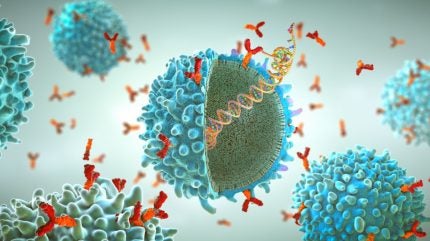
AI has frequently been in the headlines recently due to its potentially transformative capabilities — and the technology is making a notable difference in cell and gene therapies.
Cell and gene therapies offer hope to patients living with conditions such as cancer, sickle cell disease, and autoimmune conditions. Historically, these therapies have been associated with high costs and lengthy development timelines. However, AI is starting to change all of this. While applications of AI are still in the relatively early stages, specific use cases are already making a significant impact.
“AI is helping to unlock the potential of cell and gene therapy,” explains Dalip Sethi, Commercial Leader in Cell Therapy Technologies for North America, Terumo Blood and Cell Technologies. “One of the big challenges in cell and gene therapy manufacturing is consistent output. AI can potentially help with that,” he adds.
How data is key to unlocking the potential of AI in cell and gene therapy
For AI to be effective, high volumes of quality data are required. As cell and gene therapy is a relatively new field, such vast datasets are not yet available. Given this need for volume, there is a temptation to try and collect as much data as possible — but this is not the most productive approach. Precision is essential.
“It’s all about quality data. The more quality data you feed into it, the more effective AI will be,” says Sethi. “But it’s also being selective about exactly what data you need,” he adds.
Previously, delays in cell and gene therapy development were partly due to the time required to collect and analyze process parameters. For instance, developers often had to wait up to six weeks for cell culture media analysis results to be returned from the lab. However, REBEL, an at-line cell culture media analyzer from 908 Devices, can measure concentrations of over 30 media components in about 10 minutes — directly at the bench.
“Our devices provide access to critical information at the point of need,” says Boris Aleynik, Director of Strategy and Product Marketing at 908 Devices, a specialist provider of process analytical technology solutions.
“With REBEL, customers can analyze composition of fresh media and monitor consumption of amino acids throughout the cell culture, which are essential for protein synthesis and for cell growth. We’re enabling them to do that quickly and efficiently and not wait weeks for results,” adds Aleynik. “That data can serve as an input for modeling — for machine learning, expert systems, and training of AI,” he adds.
Typically, the primary real-time measurements in cell and gene therapy manufacturing have been for dissolved oxygen, pH levels, and temperature within cell cultures. Measuring additional parameters such as glucose and lactate has previously required manual interventions, limiting the quantity of data that can be acquired and increasing the risk of contamination.
Real-time data monitoring of cell and gene therapy processes
MAVEN, developed by 908 Devices, enables automatic real-time monitoring and control of glucose and lactate concentrations in cell culture processes. By connecting to the bioreactor via a sterile probe or flow cell, MAVEN enables manufacturers to gain insights into cell expansion without disrupting processes or risking contamination.
Measurements can be taken as frequently as every two minutes, providing real-time data on culture progression. This capability enhances monitoring of cell expansion and helps ensure process robustness. Having the latest data on cellular metabolic dynamics allows users to monitor health of expansion in adherent cell cultures or to determine the optimal harvest timing during expansion of chimeric antigen receptor (CAR) T cells.
“They could then make decisions on optimizing the perfusion rates — determining how much media to circulate through the bioreactor to maintain optimal concentrations of nutrients and metabolites, ensuring the cells grow as quickly as possible and achieve the desired phenotype,” says Aleynik.
“With online data, operators can optimize and maintain tighter control over cell culture conditions. Currently, in Quantum Flex™ Cell Expansion Systems from Terumo Blood and Cell Technologies, perfusion rates are not adjusted automatically, and this data is used solely for monitoring purposes. However, in the future, we may be able to implement feedback control, enabling automated process optimization,” adds Aleynik.
The evolution of AI in cell and gene therapy production
For all the potential of technologies such as generative AI, their adoption in highly regulated fields like medicine and biopharma is approached with caution. While generative AI models can provide rapid answers, these must be rigorously scrutinized to ensure their accuracy and reliability.
Despite these challenges, the use of large language models (LLMs) is gaining traction in analytics, enabled by data from process analytical technology (PAT) solutions from companies like 908 Devices.
“It is possible to use natural language to set up experiments and analyze the data,” explains Aleynik. “Data can be directly queried using natural language and then analyzed to provide results,” Aleynik continues. “This approach democratizes access to data analysis. Traditionally, you would need statisticians or someone highly skilled in data analysis. With LLMs, those barriers are lowered, making data analysis more accessible.”
In cell and gene therapy, AI will likely support processes and workflows rather than take the lead. “Looking through the cell collection database, AI is going to be really useful for that,” says Sethi.
Over time, the efficiencies enabled by the technology could potentially bring therapies to market more quickly and allow more patients to benefit from treatments at potentially lower costs.
“You will always need that human input,” adds Sethi.
Quantum Flex™ is either a registered trademark or trademark of Terumo BCT, Inc. in the United States and/or other countries. See TerumoBCT.com/Trademarks for details. MAVEN, REBEL, and 908DEVICES are either registered trademarks or trademarks of 908 Devices Inc. in the United States and/or other countries.

